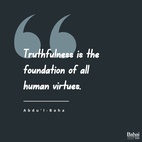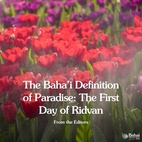The views expressed in our content reflect individual perspectives and do not represent the official views of the Baha'i Faith.
Quiz time! Who said “It is better to light a candle than to curse the darkness?” Lots of people have said it, of course—but who said it first?
Most people think, when they hear this familiar piece of proverbial spiritual wisdom, that it must have come from some historical and venerable source. It sounds truly wise, inspirational, something an ancient Roman sage might’ve said. Surprisingly, it’s not ancient at all.
A British lawyer and human rights advocate named Peter Benenson coined the iconic phrase in 1961 when he founded the non-governmental organization Amnesty International, which focuses on freeing prisoners of conscience around the world. Benenson had written a letter to the editor of the London Observer newspaper, protesting the treatment of two Portuguese students sentenced to seven years in prison for raising their glasses in a toast to freedom. When the newspaper published his letter, Benenson decided that he needed to do something more than just write a letter—so he started Amnesty International, now one of the world’s most prominent human rights organizations. Look at Amnesty’s logo—a candle circled by barbed wire—and you’ll understand the origin of the phrase even more graphically.
The spiritual content of Benenson’s quote resonates with so many of us because we all understand darkness as a common metaphor for ignorance or evil. Thousands of references to darkness fill the scriptures of many diverse Faiths. In those scriptures, darkness can refer to death, to those considered purely evil, to harmful actions against others, to a period of ignorance before the realization of faith (“seeing the light”), or to a willful ignoring of the laws of God. Here’s one of many Biblical references:
The night is far spent, the day is at hand: let us therefore cast off the works of darkness, and let us put on the armor of light. – Romans 13:12.
In the Torah, Genesis describes the world as beginning in darkness, before God creates light, and separates light from darkness. Interestingly, Genesis says that the sun and moon didn’t get created until the fourth day—so in the Torah, light actually precedes the sun; more evidence that we should take the Bible symbolically, not literally. The Old Testament calls darkness “the second to last plague” in Exodus 10:21; and the New Testament says it causes the “weeping and gnashing of teeth” in Matthew 8:12. In Biblical descriptions of Hell, fire gives no light, casting that symbolic place of perdition into eternal darkness.
The Qur’an says that those who transgress the bounds of righteousness will suffer “burning despair and ice-cold darkness.” – Surah 78.25.
Taoist philosophy portrays the two opposing forces of yin and yang, with yin represented by a dark lobe in the spinning Tajitu, the Tao’s supreme, ultimate diagram of life. That divided circle, along with its analogues in ancient Celtic, Etruscan and Roman cultures, symbolizes the interplay of light and darkness in all aspects of human life, including each individual’s character.
Most people have had the experience of lighting a small candle in a dark room, and have seen what happens—the darkness flees. Just that one tiny flame causes it to retreat, in much the same way that an act of pure spiritual goodness can conquer evil.
The Dark Night of the Soul
The 16th-century Christian mystic St. John of the Cross wrote The Ascent of Mount Carmel, a study of a soul looking for perfect union with God, as a commentary on his earlier poem “The Dark Night of the Soul.” In it, St. John used the darkness of night to represent the tests and difficulties we can all experience as we grow and mature spiritually.
In the Baha’i teachings—which treat the subjects of good and evil in a much more nuanced way than many earlier traditions—darkness doesn’t mean evil. Instead, it represents nothingness:
… one thing may be evil in relation to another but not evil within the limits of its own being. It follows therefore that there is no evil in existence: Whatsoever God has created, He has created good. Evil consists merely in non-existence. … Darkness is the absence of light: When light is no more, darkness reigns. Light is a positively existing thing, but darkness has no positive existence; it is merely its absence. …
It is thus evident that all evil is mere non-existence. Good has a positive existence; evil is merely its absence. – Abdu’l-Baha, Some Answered Questions, newly revised edition, p. 304.
The Baha’i teachings see total darkness as purely symbolic. Baha’is do not believe in Hell or Satan or pure, embodied evil of any kind—instead, the Baha’i teachings describe darkness as a symbol of an unenlightened soul.
So in many ways, “It is better to light a candle than to curse the darkness” fits beautifully into the Baha’i world view. It expresses the Baha’i perspective of the non-existence of pure darkness and evil, and it symbolizes the coming of enlightenment and knowledge into the world:
When the light of Baha’u’llah dawned from the East, He proclaimed the promise of the oneness of humanity. He addressed all mankind, saying, “Ye are all the fruits of one tree. There are not two trees: one a tree of divine mercy, the other the tree of Satan.” Again He said, “Ye are all the fruits of one tree, the leaves of one branch.” This was His announcement; this was His promise of the oneness of the world of humanity. Anathema and execration were utterly abrogated. He said, “It is not becoming in man to curse another; it is not befitting that man should attribute darkness to another; it is not meet that one human being should consider another human being as bad; nay, rather, all mankind are the servants of one God; God is the Father of all; there is not a single exception to that law. There are no people of Satan; all belong to the Merciful. There is no darkness; all is light. All are the servants of God, and man must love humanity from his heart.” – Abdu’l-Baha, The Promulgation of Universal Peace, p. 266.

















Comments
Sign in or create an account
Continue with Facebookor